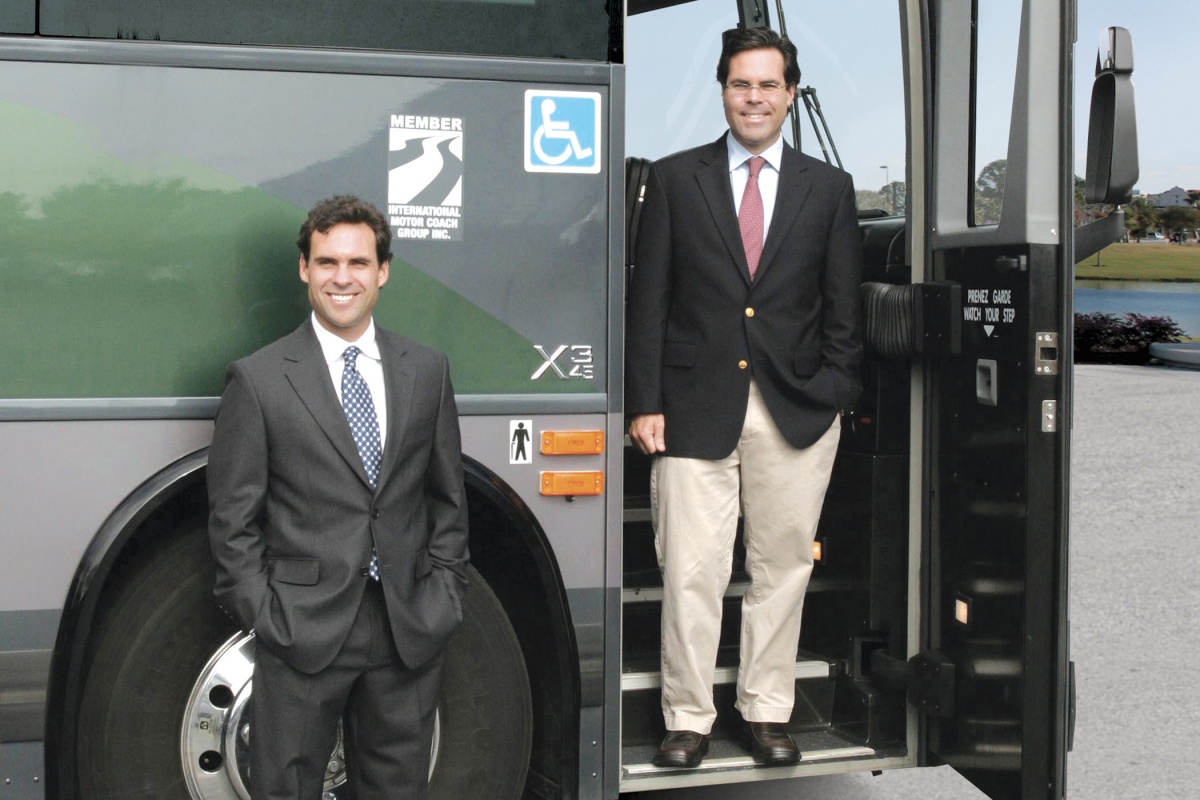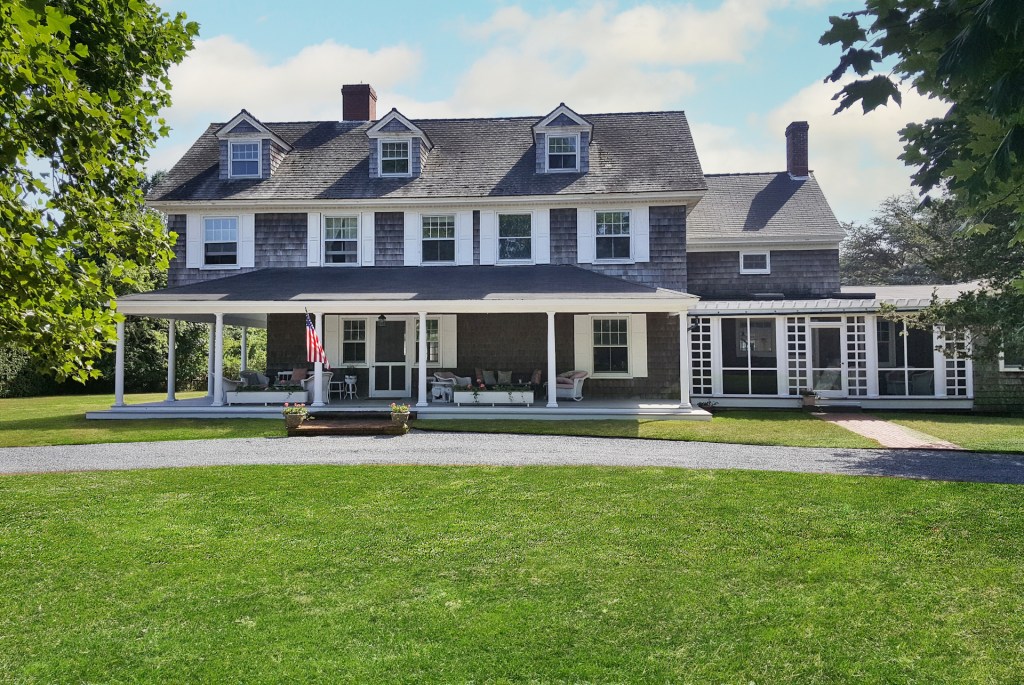Hampton Jitney CEO Geoff Lynch: Looking Back, Looking Ahead

As we celebrate the 40th anniversary of Hampton Jitney, CEO Geoff Lynch discusses his company’s impact on the Hamptons, the evolution of a family business, riders finding romance on the roadways and what we can look forward to in the next 40 years.
Dan’s Papers: How did the Jitney figure out that coach service between NYC and the East End could be such a good business?
Geoff Lynch: When Jim Davidson started the company, it was meant to be a shuttle service between the hamlets of the Hamptons. It wasn’t until the end of the 1974 season that he realized he’d lost his shirt and the loans were coming due, and then he had some folks ask him for help getting their stuff back into the city because they were closing up their houses for the season. He charged them some money, and that very quickly turned into the idea of running scheduled service from the city out to the Hamptons. So, the city routes actually came into being pretty quickly, in 1975.
The Jitney has provided easy accessibility to the Hamptons for urbanites who might not have been willing or able to drive such a distance. What effect do you think you’ve had on the Hamptons over the years?
I would like to think, and I can’t say if it’s true or not, that because we created accessibility to the Hamptons—where it wasn’t before with just the railroad—for people who don’t drive or who don’t keep a car in the city, that we enabled to a certain degree the growth in the real estate market. The accessibility allowed a lot of people, not just part-timers but full-time East Enders who work in the city, to come out here more frequently and invest in houses and build properties out here. Whether we contributed to the growth and development of the East End or simply benefitted, it’s hard to say, but certainly a lot of people have relied upon us over the years to get back and forth.
The Hampton Jitney is not like most other buses. How did the relative luxury of the “Jitney Experience” come about?
That goes back to the very beginning, to the founder Jim Davidson. Prior to starting Hampton Jitney, he was an advertising guy, a marketing guy. He, like so many people from New York City, didn’t typically ride buses, except for city buses on short trips, and he knew his clientele didn’t either. So, to cater to his customers and entice them, he devised the idea of having a host person onboard, which you don’t see in normal intercity bus transport. It was modeled after airline travel. That host person was put on board, number one, to collect fares, but also to serve our passengers those amenities we serve—the juice, the water, the popcorn, peanuts, pretzels. All of that was meant to add an upper-class service relative to normal bus travel. For a lot of people that come out here, this is their one and only bus experience.
Are the coaches themselves different?
Each of our coaches is essentially a custom-made vehicle. There are only maybe 1,000 of these coaches made a year. They’re known in the industry as the best coaches, and we outfit them with special seats, special interiors that are different from standard intercity buses. There are additional climate-control compressors in the overheads that are not on standard vehicles, to give them a higher quality and a more comfortable feel than standard coaches.
Newcomers to the area usually wonder about the word “Jitney.” It doesn’t really describe your service. Why did you choose to keep it?
The word “bus” is a word we try not to use around here—we try to say “motor coach” or “coach.” “Hampton Bus” just didn’t sound that great. “Jitney” is an old English word and meant smaller vehicles and shorter trips, but it helps distinguish us and has served us very well.
A couple of years ago, we needed to get a package to the city very quickly, and was pleasantly surprised to learn that the Hampton Jitney offers a courier service. Are there any other services you offer that people might not know about?
Besides the package express that you’re talking about, we are also a transportation broker for car transport. We will transport your car to and from Florida, and the nice thing about our service as opposed to a regular car transport is our service is on a schedule. Where with a regular car transport you give them your car and they’ll say “Okay, we’ll call you in three weeks and let you know when to expect it,” with us we can tell you when to expect your car in West Palm Beach or Fort Myers or any of our other Florida stops.
We also have our multi-day tours, and this year we’re going as far west as Mackinaw Island in Michigan. We go to Nova Scotia, Maine, Cape Cod—so there are a lot of tours where we’re taking East Enders off the island.
What are you doing to celebrate the 40th? Your ads are referring to 1974 with some retro lettering—can we expect shag carpeting and 8-track players to be installed next?
Well, we are making some references to the ’70s. If you think about a 1970s subway car and what it looked like during that time period with all of the graffiti, we happen to have an employee here—his name is Francis Quigley, and he grew up in Brooklyn—and he’s a very talented artist who started as a graffiti artist. So we took one of our older coaches and had Francis design a Hampton Jitney logo that would be along the graffiti-art lines and get as creative as he wanted to. He did one side of it here in the Southampton yard just to get a feel for it, and then over Memorial Day weekend we parked the coach at our stop on 40th Street and had him finish off the coach right there in front of everybody.
We also had a contest that we threw out to everybody to see who could design a 40th anniversary vinyl wrap—that’s the word for the covering that allows coaches to be completely covered with those colorful ads. We got quite a few responses, and we’re going to be wrapping a couple of coaches this summer in honor of the 40th.
Then what we’ll do is we’ll have some giveaways for people who get on these 40th anniversary buses. We’re going to do some beach towels, some luggage tags—things that people might need when they’re traveling to and from the East End.
What about all of the stories we hear about people falling in love on the Jitney?
We have a lot of stories of people who have met, wound up dating and ultimately getting married. We have some neighbors in Sag Harbor who invite me and my wife over each fall for a party, and they attribute their meeting, falling in love and winding up out here to the Jitney. A lot of it is the people who wind up on our coaches—it’s a pretty eclectic group. They all come together on the Jitney, and when I go out and drive it’s always kind of interesting to see how people interact with each other. Sometimes it can be a little bit difficult, a little bit crowded, but they settle down and realize they’re going to be with these people for a few hours at least.
So maybe that forced interaction leads to people making connections. You mention that sometimes you drive the buses as well, and that reminds us that the Jitney is a family business in which you and your siblings, as well as your parents before you, have served in a lot of positions.
My parents purchased Hampton Jitney from Jim Davidson when I was just getting out of high school, so my three siblings and I all wound up spending our summers working here. We all started as host people on coaches—myself, my sister and two brothers. In college I got my CDL and spent a good amount of time after college working for my dad. I worked in the shop, I worked in the accounting department and I drove. My brother Peter is one of the mechanics, and my brother Andrew, who has a finance background, also works with us now.
What do you see changing at the Jitney over the next 40 years?
First of all, the coaches that we run will probably move to hybrid-style drivetrains, whether it’s diesel-electric or natural gas, that is coming in the more immediate future. Also, the idea that a coach could do a route essentially without a driver is a definite possibility. I think what will happen in the future is rather than having a commercial driver on that coach, you’ll have a programmer or someone who is simply monitoring that vehicle as it’s going down the road. That’s coming.
Will the hosts be replaced by host-bots?
(Laughing) Well, maybe so. At the Hampton Jitney we’ve always had this additional host person who is there to cater to the passengers, and I don’t see that going away any time soon.
After 40 years of motor coach service to the East End and beyond, what are you most proud of?
We are proud that we have become an established part of this community, that people who live out here or travel out here rely upon us. We are proud that we are one of the larger employers on the East End and we provide jobs for 200 people—and for many of those 200 people it has been their livelihood for 30-plus years. When I go out of this community, whether it’s because our buses have been in Sex and the City or another movie, people know about the Hampton Jitney, and there are not many bus companies that can say that. For a regional company to have a wide reputation for quality coach service is probably what I’m most proud of.



